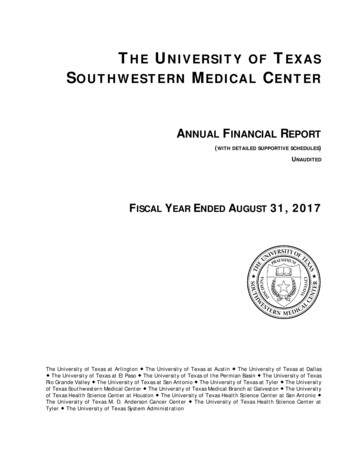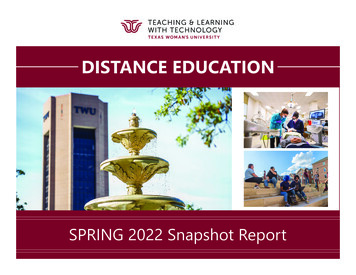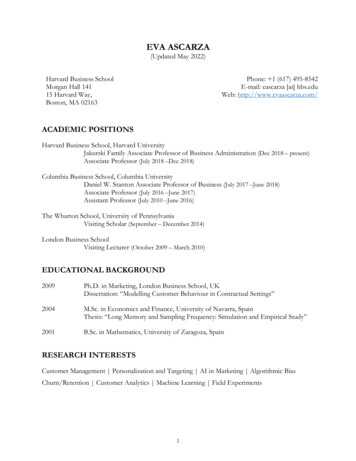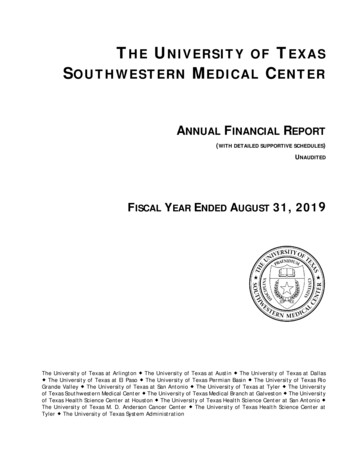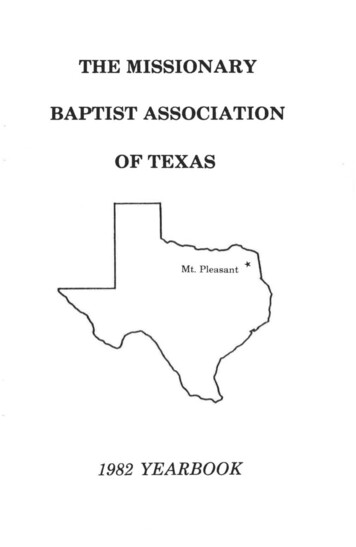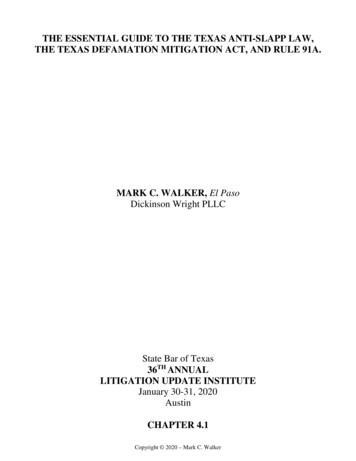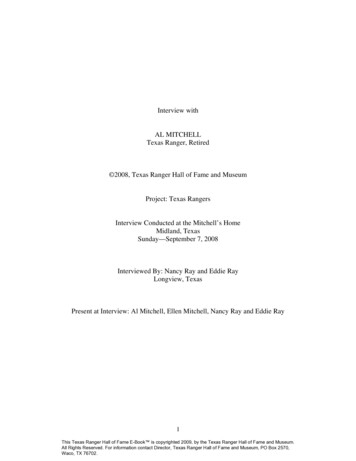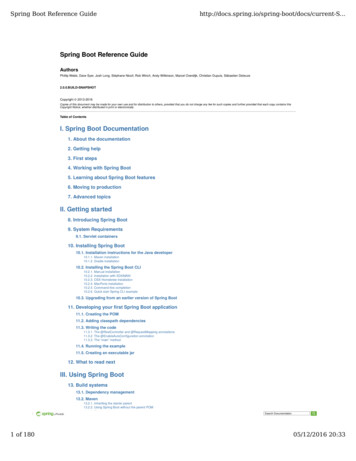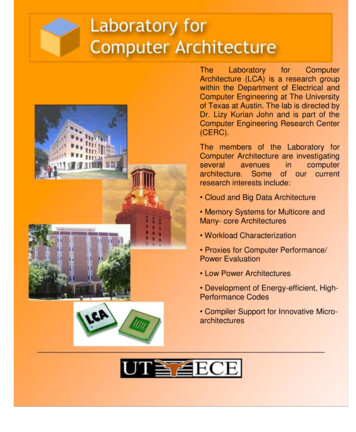
Transcription
tecture (LCA) is a research groupwithin the Department of Electrical andComputer Engineering at The Universityof Texas at Austin. The lab is directed byDr. Lizy Kurian John and is part of theComputer Engineering Research Center(CERC).The members of the Laboratory forComputer Architecture are investigatingseveralavenuesincomputerarchitecture. Some of our currentresearch interests include: Cloud and Big Data Architecture Memory Systems for Multicore andMany- core Architectures Workload Characterization Proxies for Computer Performance/Power Evaluation Low Power Architectures Development of Energy-efficient, HighPerformance Codes Compiler Support for Innovative Microarchitectures
Cloud and Big Data ArchitectureAnalyzing massive amountsof data, deriving insight andseeing things one could notsee before has become important for businesses, medicine, world economy andhuman life in general. It isimportant that next generation computer systemshandle these analytics workloads efficiently. Our studieswill attempt to understand emerging big data computingworkloads io drive hardware and software development.Memory Systems for Multicore ArchitecturesAsmicroprocessorsmove from the multicore to the many-coreera, the Von Neumann memory bottleneck isbecomingmore critical. For instance, the SPARCserverplatformroadmap (2010 to2015) projects a 32X increase in the number of threadsin 5 years. To be able to leverage such abundant computing power, it is important to design efficient memorysubsystems. We are currently looking at different memoryconfigurations, hierarchies and data partitioningalgorithms that can minimize the number of off-chip (oroff-node) memory accesses and/or minimize the latencies observed by the processing unit.Workload CharacterizationWorkload characterizationand identification of bottlenecks allows computer architects to design computersystems that yield high performance, energy-efficientoperation and reliability. Ourresearch group focuses onworkload characterization ofemerging application domains and emerging processor architectures. Understanding the nature of programs and the workload behavior leads to the design of improved computer architectures.Proxies for Performance/Power EvaluationWe are working oncreating proxy workloads for big dataand cloud workloads. Our researchalso includes creation of power, reliability and thermalstressmarks thathelp to identify guard-bands in design.We develop automated procedures to develop benchmarks andstressmarks that test and validate modern computersystems from performance, power, energy, thermaland reliability perspectives.DevelopmentofPerformance CodesEnergy-efficient,High-Among the many hurdles faced in researchand development ofcompute-intensivecodes is achieving highperformance and energyefficiency. We work withcomputational scientiststo identify bottlenecks intheir codes as they execute on modern computer systems. Algorithmscreated by computational scientists will be analyzed and optimizations toimprove performance and energy-efficiency incorporated. We perform thorough evaluations of high performance codes and co-design the codes to explorealternative algorithm/hardware scenarios.Compiler Support for MicroarchitecturesOur research in this area focuses primarily on identifyingmechanisms that will allowcompilers to provide hints tothe microarchitecture in orderto increase its efficiency andmaximize the performance. Weare currently looking at thetradeoffs of data prefetchingand bus utilization, as well as compiler support forinnovative mechanisms such as the VBBI IndirectBranch Predictor and SLB Branch Predictor.
currently working on analysis and design ofmemory scheduling policies.Michael LeBeane is a Ph.D. studentwho joined LCA in Fall 2013 Hereceived his undergraduate degreesfrom Washington University in St.Louis and is currently working oncharacterizing big data and cloudworkloads.Dr. Lizy Kurian John directs the Laboratory forComputer Architecture (LCA). She holds the B. N.Gafford Professorship and is an EngineeringFoundation Centennial Teaching Fellow in theElectrical and Computer Engineering department atUT Austin. She has received several awardsincluding the Texas Exes teaching award, the UTAustin Engineering Foundation Faculty award, theHalliburton Young Faculty award, the NSFCAREER award, UT Alumni Association Teachingaward, and the Penn State University OutstandingEngineering Alumnus award. She is an IEEE fellow,a senior member of IEEE Computer Society, and amember of ACM, ACM SIGARCH, Eta Kappa Nu,Tau Beta Pi and Phi Kappa Phi Honor Societies.Reena Panda joined UT Austin Fall2013. Before joining UT, she receivedmy Masters in Computer Engineeringfrom Texas A&M University in Fall 2011.Her research interests lie in big-dataworkload characterization/ modeling andcore micro-architecture.Jiajun Wang is a Ph.D. student whojoined LCA Spring 2014. She is currentlyworking on HPC workloads analysis andoptimization.Ahmed Khawaja is a Ph.D student andjoined LCA Spring 2014. His researchinterests are architecture bottleneckidentification.Maithili Gandhe is a Ph.D. student inLCA. Her research interests aredynamicpowermanagement,ubiquitous computing, user-basedpower/performance optimization, etc.Jungho Jo is a Ph.D. student andjoined the LCA in Spring 2008. Healso received his MS degree at UT.He is currently working on ISAindependent synthetic benchmarksfor early design stage analysis.Jee Ho Ryoo is a Ph.D. student at UTand joined LCA in Fall 2011. Hereceived his M.S degree fromUniversity of Texas at Austin. He isWooseok Lee is a Ph.D. student. Hereceived his M.S. degree from INHAUniversity, Korea. His research interestsare improving energy efficiency ofheterogeneous system and powermodeling of processor.Shuang Song is a Ph.D student. Hejoined LCA in Fall 2014. His is nowworking on performance and powercharacterization of TPCx-HS.
multi-cores and models for such systems. He iscurrently working at Intel.Dr. Youngtaek Kim received his Ph.D.from UT in Spring 2013.His researchincludedautomatictestandmanagement of voltage noise inmicroprocessorpowerdistributionnetworks. He currently works at AMD.Dr. Arun Nair graduated with his Ph.D.in May 2012. His research was in theareas of architectural vulnerability andreliability. He is currently employed as aperformance architect at AMD.Dr. Umar Farooq graduated with hisPh.D. in spring 2013. His researchinterests include compiler and microarchitecture interaction. His thesis workwas on guided power aware ILPextraction and branch prediction.Dr. Faisal Iqbal received his Ph.D fromUT in August 2013.His researchinterests included multi-core power/performance optimization, networkprocessing and hard-ware accelerators.Dr. Dimitris Kaseridis received hisPh.D. from UT in May 2011. He joinedLCA in Fall 2005. He has a Masters(2005) and Diplo-ma (2004) degree inComputer Engineering and Informaticsfrom the University of Patras, Greece.Dimitris worked on design, performance evaluation& analysis of multithreaded multicore systems alongwith high performance microprocessor design. He iscurrently working at ARM.Dr. Jian Chen received his Ph.D. inMay 2011. He joined LCA in Summer2006. He received his MS degree inelectrical engineering from ShanghaiJiao Tong University, China. He workedon power aware microarchitectures forDr. Jeff Stuecheli received hisPh.D. in May 2011. He joined LCAin 2000. He has worked full time atIBM Austin in microprocessordevelopment since 1997. Hisresearch interests include cachehierarchy,CMP,coherence,performance/power analysis/optimization, andbenchmarking.Dr. Ciji Isen received the Ph.D. inMay 2011. He joined LCA in Fall of2005 and has a Masters degreefrom Texas A&M University. Heworked on improving memorysystems using memory stateknowledge. He joined AMD in 2011.Dr. Karthik Ganesan received hisPh.D. from UT Austin in December2011. He joined LCA in Fall 2006.He holds a BE in ComputerScience and Engineering (2006)from Anna University during whichhe was a Part time research trainee at WaranResearch Foundation, India. He worked onPerformance Evaluation of High performanceMultiprocessor Systems. He is currently working atOracle.Dr. Lloyd Bircher received hisPh.D. in December 2010. He joinedLCA in 2002 and has a Bachelor ofScience in Electrical Engineeringfrom the University of Texas atArlington and a Master of Sciencein Computer Engineering from the University ofTexas at Austin. He worked in the area of softwaredirected power management of microprocessorsystems. He is currently at AMD.
Dr. Ajay Joshi graduated with a Ph.D in December 2007. His researchwas on synthetic bench-marks,especially stress bench-marks forpower and thermal evaluation. Hecurrently works for ARM.Dr. Aashish Phansalkar graduatedwith a Ph. D in 2007 May. Hisresearch centered on similarityanalysis of workloads. He currentlyworks for Intel. Before that he workedfor Marvel Technologies.Dr. Shiwen Hu received his Ph.D. in2005. He joined LCA in 2000.Shiwen has a M.S. degree fromTsinghua University of China.Shiwen’s dissertation was onefficient adaptation of multipleconfigurable units using dynamic optimizationsystems for microprocessor energy reduction. He iscurrently employed at Freescale.Dr. Rob Bell received his Ph.D fromthe University of Texas at Austin in2005. He holds under-graduate andM.S.E.E.degreesfromtheUniversity of Virginia, and isemployed full-time at IBM, Austin,as a computer designer. His research deling and simulation, and representativeworkload synthesis.Dr. Yue Luo received his Master'sDegree in electronics from PekingUniversity. Under Professor John'ssupervision, Yue Luo did researchin workload characterization andmicroprocessorsimulationmethodology. He graduated with aPh.D. degree in 2005. Yue is now working atMicrosoft as a Software Development Engineer inTest.Dr. Byeong Kil Lee is currentlyVice President at Samsung. He isworking on designing a highperformance processor for nextgeneration handheld devices. Hisresearchinterestsincludeperformance modeling, workload, characterization,formal verification, network -processor, multimediaprocessor and performance analysis. He receiveda Ph.D in computer engineering from UT Austin in2005.Dr Madhavi Valluri obtained herPh.D. degree from the Universityof Texas at Austin in May 2005.Madhavi works in the Systems andTechnology Group at IBM (Austin)on improving performance ofgeneral-purpose programs via code analysis. Herresearch interests include compiler and microarchitectural techniques for high performance andlow power.Dr. Juan Rubio received his Ph.D.from UT, Austin in August 2004. Hecurrently works at IBM AustinResearch Lab.Dr. Tao Li received the Ph.D.degree in computer engineeringfrom the University of Texas atAustin in 2004. He is now anassociative professor in theDepartment of Electrical andComputer Engineering at University of Florida. Hisresearch interests include computer architecture,low power, secure and dependable valuation, the impacts of emerging techniquesand applications on computer designs, operatingsystems and compilers.
Dr. Ravi Bhargava received hisPh.D. from UT Austin in 2003.Raviis currently a member of the servermicroprocessor design team atAdvanced Micro Devices in Austin,Texas. His responsibilities at AMDinclude microarchitecture design, performancemodeling, and virtualization support.Dr. Deepu Talla graduated from TheUniversity of Texas with a Ph.D. inComputer Engineering in 2001.Currently he is Vice President andGeneral Manager of the MobileBusiness Unit at NVIDIA. He was atTexas Instruments for 10 years before joiningNVIDIA. He is responsible for the product andarchitecture definition of portable multimedia SOCHe was one of the core architects of the recentlyannounced "DaVinci (TM)" platform.Dr. Ramesh Radhakrishnangraduated from UT Austin in August 2000. Since June 2004, hehas been working as a senior design engineer in Dell's HighPerformance Computing Team,where he is responsible for designing HPC products that achieve the rawcomputing power of classic "bigiron" ogies. Currently he serves as Technologist atthe Office of the CTO, Dell.
AUDIT: Stress Testing the Automatic WayYoungtaek Kim, Sanjay Pant, Srilatha Manne, MichaelSchulte, Lloyd Bircher, Madhu Saravana Sibi Govindan,and Lizy K. John. The 45th International Symposium onMicroarchitecture (MICRO'45). December 2012.Performance Analysis of HPC Applications withIrregular Tree Data StructuresAhmed Khawaja, Jiajun Wang, Dhairya Malhotra,Andreas Gerstlauer, George Biros and Lizy John. The20th IEEE International Conference on Parallel andDistributed Systems. December 2014Control Flow Behavior of Cloud WorkloadsJee Ho Ryoo, Michael LeBeane, Muhammad FaisalIqbal, and Lizy K. John. The IEEE InternationalSymposium on Workload Characterization (IISWC)(Poster). October 2014.FastSpot: Host-Compiled Thermal Estimation forEarly Design Space ExplorationDarshan Gandhi, Andreas Gerstlauer, and Lizy K. John.The 15th IEEE International Symposium on QualityElectronic Design (ISQED). March 2014.Performance Boosting under Reliability and PowerConstraintsYoungtaek Kim, Lizy K. John, Indrani Paul, SrilathaManne, and Michael Schulte. The 34th IEEE/ACMInternational Conference on Computer-Aided Design(ICCAD). November 2013.Flow Migration on Multicore Network Processors:Load Balancing While Minimizing Packet ReorderingMuhammad Faisal Iqbal, Jim Holt, Jee Ho Ryoo, Gustavode Veciana, and Lizy K. John. The 42th IEEEInternational Conference on Parallel Processing (ICPP).October 2013.Store-Load Branch (SLB) Predictor: A CompilerAssisted Branch Prediction for Data DependentBranchesMuhammad Umar Farooq, Khubaib, and Lizy K. John.The 19th IEEE International Symposium on HighPerformance Computer Architecture. March2013.A First-Order Mechanistic Model for ArchitecturalVulnerability FactorArun A. Nair, Stijn Eyerman, Lieven Eeckhout, and LizyK. John. The 39th International Symposium onComputer Architecture (ISCA-39). June 2012.Power and Performance Analysis of NetworkTraffic Prediction TechniquesMuhammad Faisal Iqbal and Lizy K. John.IEEE International Symposium on PerformanceAnalysis of Systems and Software (ISPASS). April2012.Minimalist Open-page: A DRAM Page-modeScheduling Policy for the Many-core Era(Best Paper Nominee)Dimitris Kaseridis, Jeffrey Stuecheli, and Lizy K.John,44th International Symposium on Microarchitecture(MICRO'44). December 2011.MAximum Multicore POwer (MAMPO) - AnAutomatic Multithreaded Synthetic Power VirusGeneration Framework for Multicore Systems(Best PapernoNonee)Karthik Ganesan and Lizy K. John, Super ComputingConference (SC 2011). November 2011.Coordinating DRAM and Last-Level-Cache Policieswith the Virtual Write QueueJeff Stuecheli, Dimitris Kaseridis, David Daly, HilleryHunter, Lizy K. John, IEEE Micro, Special Issue on theTop Picks from the Computer ArchitectureConferences, January/February 2011.AVF Stressmark: Towards an AutomatedMethodology for Bounding the Worst-caseVulnerability to Soft ErrorsArun A. Nair, Lizy K. John, and Lieven Eeckhout, 43rdInternational Symposium on Microarchitecture(MICRO'43). December 2010.Elastic Refresh: Techniques to Mitigate Refresh
Penalties in High Density MemoryJeff Stuecheli, Dimitris Kaseridis, David Daly, HilleryHunter, and Lizy K. John, 43rd Interenational Symposium on Microchitecture (MICRO'43). December 2010.System-level Max Power (SYMPO) - A SystematicApproach for Escalating System Level Power Consumption Using Synthetic BenchmarksKarthik Ganesan, Jungho Jo, W. Lloyld Bircher, DimitricsKaseridis, Zhibin Yu, and Lizy K. John, 19th InternationalConference on Parallel Architecture and CompilationTechniques (PACT). September 2010.The Virtual Write Queue: Coordinating DRAM andLast-Level Cache PoliciesJeff Stuecheli, Dimitris Kaseridis, David Daly, HilleryHunter, and Lizy K. John, 37th International Symposiumon Computer Architecture (ISCA). June 2010.Bandwidth-aware Memory-subsystem ResourceManagement using Non-invasive Resource Profilersfor Large CMP SystemsDimitris Kaseridis, Jeffrey Stuecheli, Jian Chen, and LizyK. John, 16th International Symposium on Highperformance Computer Architecture (HPCA). January2010.Value Based BTB Indexing (VBBI) for Indirect JumpPrediction (Best Paper Nominee)Muhammad Umar Farooq, Lei Chen, and Lizy K. John,16th International Symposium on High-PerformanceComputer Architecture (HPCA). January 2010.ESKIMO - Energy Savings using SemanticKnowledge of Inconsequential Memory Occupancyfor DRAM subsystemCiji Isen and Lizy K. John, 42nd InternationalSymposium on Microarchitecture (MICRO). December2009.Automated Microprocessor Stressmark GenerationAjay Joshi, Lieven Eeckhout, Lizy K. John, and CijiIsen, 14th International Symposium on HighPerformance Computer Architecture (HPCA) . February2008.Analysis of Redundency and Application Balance inthe SPEC CPU2006 Benchmark SuiteAashish Phansalkar, Ajay Joshi, and Lizy K. John, 34thInternational Symposium on Computer Architecture(ISCA). June 2007.Performance Evaluation andBenchmarkingLizy Kurian John , Lieven EeckhoutTaylor and Francis, CRC press, 2005Digital Systems Design using VHDLCharles H. Roth and Lizy Kurian John,Thomson, 2007
2005 and has a Masters degree from Texas A&M University. He worked on improving memory systems using memory state knowledge. He joined AMD in 2011. Dr. Karthik Ganesan received his Ph.D. from UT Austin in December 2011. He joined LCA in Fall 2006. He holds a BE in Computer Science and Engineering (2006)



